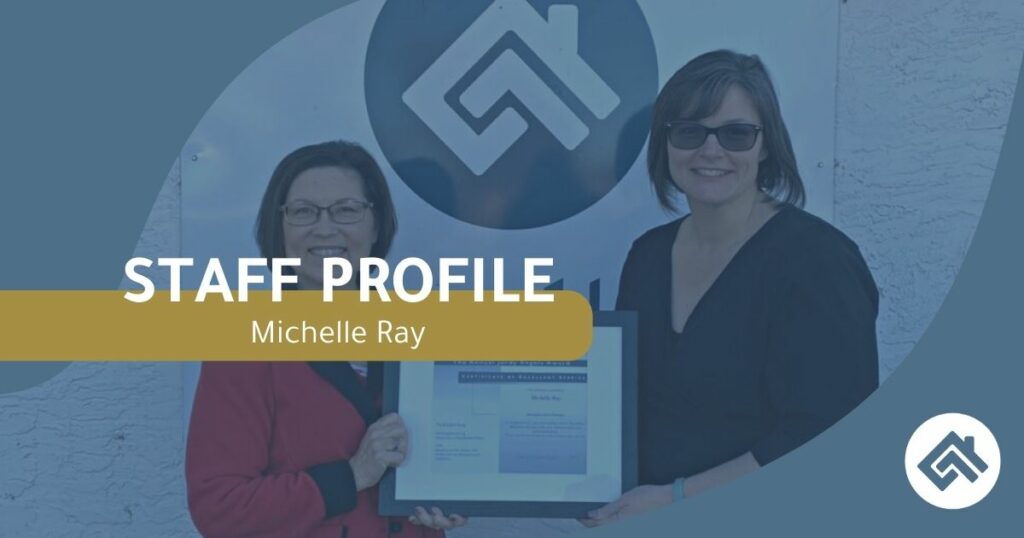Michelle Ray believes family support can change the lives of people with intellectual and developmental disabilities (I/DD). She and her family have been providing that support since 2006 as part of GoodLife’s shared living program as a Professional Extended Family Provider. Over the years, the family has shared their home with seven (7) individuals.
Michelle began her career with GoodLife in 2003 as part of our Family Teaching Model. Now, she serves as Assistant Director of Regional Services for Douglas County (Kansas), as well as being an independent contractor for the Professional Extended Family program. In 2021, Michelle won the Jordy Engels Award for her outstanding career and making a difference in so many lives. This quote was included in the letter informing her she was the winner, “Just like a pebble cast into a pond, the ripple of goodness and generosity that you have generated extends far.”
She and her husband have nine (9) kids, ranging in age from 3 to 26. Currently, two GoodLife individuals are living with the family. Michelle joins us today to talk about her shared living journey and why the program is so important.
What drew you to the Professional Extended Family Teacher model?
I liked the program because I liked the idea of getting to be a family under one roof with an individual that had already become part of your heart. When you work in this field, you see the differences that people living in your group homes have versus people that live in a family setting.
What is unique about working with GoodLife in the Professional Extended Family Teacher program?
The relationships that you build. It’s not a career, and yet it is. It’s your family. It’s so normal, but you get paid to do it. My job is literally to ensure that our family is doing family things. I get paid to take my family on vacation. I get paid to go with my family to sporting events that my kids are in. Everyday, normal life experiences – that is what I provide in my role.
How would you describe the Professional Extended Family Teacher program?
I describe it as adult foster care. It’s the easiest way for people to understand what we do. We have someone that lives with us. They have family, but they just aren’t in a position to provide care for them at this time. The person is part of our family, and I ensure that they have everything they need to be happy and healthy.
What impact has the program had on your life and those in your family?
To start with, my love language is acts of service. So, having the opportunity to care for someone, it just makes my day.
My kids grew up learning to be patient. They were quick to help others and never shied away from kids their age that had any physical and developmental disabilities.
We all learned to love unconditionally and to let things go quickly, not hold a grudge.
What impact has the program had on the individuals who have lived with you?
I think the shared living program has so many benefits for the person served. They get to live in a home with a family. That means participating in family activities like school programs and sporting events. The individuals get the stability of knowing who is going to be there when they get up in the morning and who will be there when they go to bed at night. And, most importantly, that those people care about them and are familiar with their health, behaviors, preferences, and history.
What is your favorite thing about your job?
My favorite thing is the memories I get to create. I have had the opportunity to share my family and my life with some really great people that have made me smile and laugh a lot. I am very lucky.
What is the most challenging part of the Professional Extended Family Teacher program?
There are a couple of challenging things like being able to get away for some R&R, and feeling secure that everything will be alright when you are gone. Or, needing to get procedures done at the hospital and having people discount you because you are the “caregiver,” and not family. It sucks to be with someone every day, for years, and take care of all their appointments and know everything about their day-to-day life, as well as past medical issues, but not be considered important because you don’t share the same blood.
Why is this job important?
Because everyone deserves to have a family, to have stability, to be a contributing member of society, and to be remembered long after they are gone.
Do you find your job rewarding? Why?
I do, because I love to provide care to people. I like being able to see how someone’s life has changed, just by having a family to support them.
What would you say to someone who is considering a job as a shared living provider?
I would say that it is a commitment, don’t enter into it lightly. I would tell people that relationship development is key, and that if you know the worst habits of that person and when you think of them you still smile, then you are going to be just fine as a Professional Family Teacher (PFT). Also, I would say, make sure that your extended family and friends are invested, as well, because it can take a lot to keep everything going in life. So, having that support to help, it can make a world of difference.
Are you interested in becoming a Professional Extended Family provider? Visit our careers page to submit your application. We would love to hear from you.


